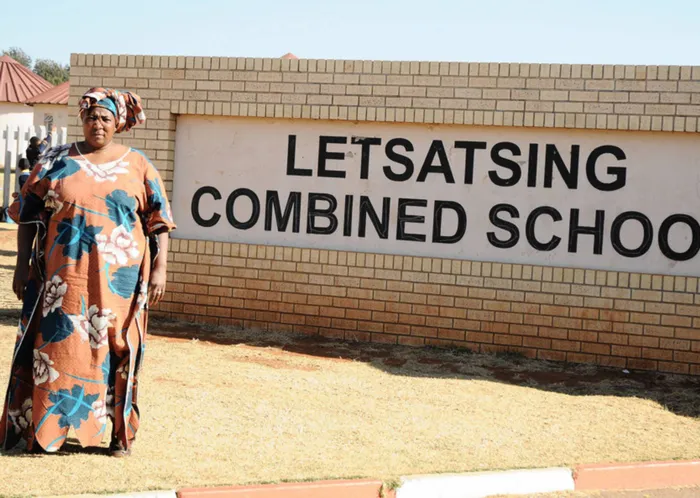No-fee school forcing parents to pay

466 24-07-2013 Mother of a grade 12 pupil at Letsatsing secondary school Cynthia Masela at the school’s gate. Letsatsing is a non-fee school but the principal demands parents to pay school fees by not giving children their reports. Picture: Tiro Ramatlhatse 466 24-07-2013 Mother of a grade 12 pupil at Letsatsing secondary school Cynthia Masela at the school’s gate. Letsatsing is a non-fee school but the principal demands parents to pay school fees by not giving children their reports. Picture: Tiro Ramatlhatse
Johannesburg - A no-fee school in Carletonville is forcing parents to pay fees of close to R1 000 – despite it being illegal for such a school to demand fees.
If parents fail to pay up, the school withholds the children’s reports, which is also unlawful, even for a fee-paying school.
The Letsatsing Secondary School, which was declared a no-fee school in 2010, offers grades R to 12. Parents with children in Grade R are required to pay R150 a month.
Fees for Grades 1 to 12, which are paid yearly, increase as the child rises up the grades with parents of children in Grade 12 paying R960 a year.
Some parents have been at loggerheads with the school’s principal and have refused to pay fees this year, leading to their children’s June reports being held back by the school.
Bongiwe Cebani, who has four children and one grandchild at the school, said her Grade 12 daughter had not been able to apply for her tertiary studies because institutions asked for her June report, which she was unable to provide.
Cebani claimed she had to pay more than R3 000 for all five children in December to have their reports released.
When she learnt that the school was a no-fee school, she demanded her money back.
“I was told to keep quiet and that the parents who had not paid will be dealt with.”
Cebani said one of her children wanted to take up a computer subject, but was told that they had to pay R500 – over and above the school fees – to use the computer lab.
Cebani, who is unemployed, said she paid this extra charge.
Cynthia Masela, who has a Grade 9 child at the school, has also refused to pay school fees.
She said parents had raised the issue with the Department of Education and an official was sent to the school earlier this year to investigate.
“The investigator came, the investigation found that parents had decided to make voluntary contributions for the upkeep and maintenance of the school as well as paying for extra cleaning staff.”
In May, in a response to written questions by DA education spokesman Khume Ramulifho, Gauteng Education MEC Barbara Creecy said the department’s investigation concluded that the school was not charging fees.
The school was declared a no-fee school in 2010 and was not allowed to charge, according to Creecy.
Education spokesman Charles Phahlane said that the department’s investigation found that parents had decided “to make voluntary contributions for the upkeep and maintenance of the school as well as paying for extra cleaning staff”.
Parents who spoke to The Star disputed this.
Phahlane said that no school may deny a child a report on the basis of non-payment.
He said parents had not received the June reports because the pupils’ marks were still being invigilated.
Phahlane added that no child may be asked to pay any fee to access a computer laboratory of a school.
“We are sending an official to the school… to investigate these allegations,” he said.
What’s a no-fee school?
Previously, public schools were divided into five quintiles or categories. Poor schools had a low-quintile ranking while more resourced schools had a higher one. Quintal rankings determined how much funding schools got from the government, with the lowest receiving more and higher-ranked schools receiving less.
A new ranking system in 2011 saw schools being divided into just two categories – fee-paying and no-fee schools. Those that fell under the no-fee category were were previously in quintiles 1 to 3 and they receive more funding.
Schools now in the fee-paying category were in quintiles 4 and 5, and they receive less funding.
Gauteng has 1 237 no-fee schools that cater for 64 percent of the province’s pupils. These schools receive R1 010 a child.
The Star